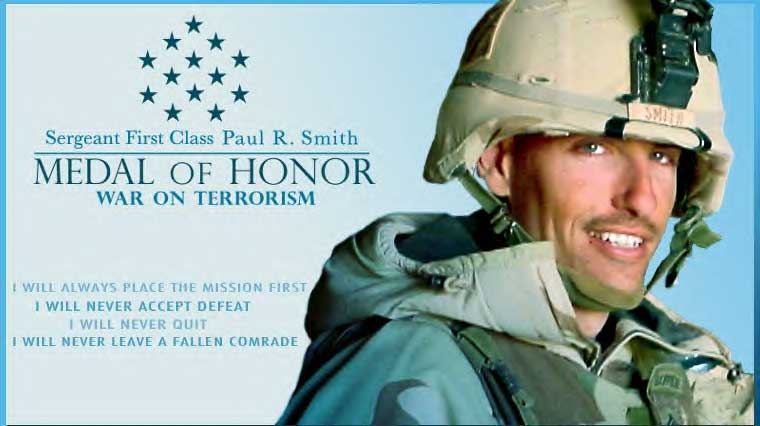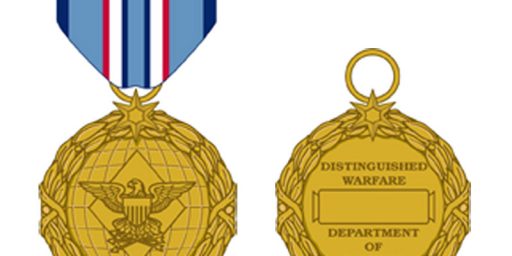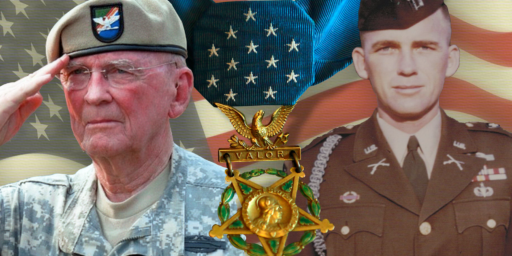Heroes Real and Manufactured
Robert Kaplan describes the heroism that earned SFC Paul Smith a posthumous Medal of Honor and the two years it took his commander to get it through the system.

As Colonel Smith told me, “Everyone wants to award a Medal of Honor. But everyone is even more concerned with worthiness, with getting it right.” There was a real fear that one unworthy medal would compromise the award, its aura, and its history. The bureaucratic part of the process is kept almost deliberately impossible, to see just how committed those recommending the award are: insufficient passion may indicate the award is unjustified.
“Nobody up top in the Army’s command is trying to find Medal of Honor winners to inspire the public with,” says Colonel Smith. “It’s the opposite. The whole thing is pushed up from the bottom to a skeptical higher command.”
Considering how much other medals have been inflated, though, once can argue this is justified even if the bureaucratic result is excessive. Kaplan has another complaint, though:
The ceremony in the East Room of the White House two years to the day after Sergeant Smith was killed, where President George W. Bush awarded the Medal of Honor to Sergeant Smith’s 11-year-old son, David, was fitfully covered by the media. The Paul Ray Smith story elicited 96 media mentions for the eight week period after the medal was awarded, compared with 4,677 for the supposed abuse of the Koran at Guantánamo Bay and 5,159 for the disgraced Abu Ghraib prison guard Lynndie England, over a much longer time frame that went on for many months. In a society that obsesses over reality-TV shows, gangster and war movies, and NFL quarterbacks, an authentic hero like Sergeant Smith flickers momentarily before the public consciousness.
It may be that the public, which still can’t get enough of World War II heroics, even as it feels guilty about its treatment of Vietnam veterans, simply can’t deliver up the requisite passion for honoring heroes from unpopular wars like Korea and Iraq. It may also be that, encouraged by the media, the public is more comfortable seeing our troops in Iraq as victims of a failed administration rather than as heroes in their own right. Such indifference to valor is another factor that separates an all-volunteer military from the public it defends. “The medal helps legitimize Iraq for them. World War II had its heroes, and now Iraq has its,” Colonel Smith told me, in his office overlooking the Mississippi River, in Memphis, where he now heads the district office of the Army Corps of Engineers.
It’s a fair point, one I addressed in some detail more than two years ago in a post entitled “Unheralded Medal of Honor Winners?”
As to why Smith has not received the acclaim accorded York and Murphy, several explanations come to mind. Mark would point to the fact that the mainstream press supported WWII and have largely not supported this one. That is almost certainly part of the explanation. Indeed, the heroes of Korea and Vietnam don’t exactly come tripping off the tongue either, do they?
But there’s more to it than that. For one thing, Smith was killed in action while Murphy and York came home alive. Surely, a live Medal of Honor winner would be seen on television with some regularity even today.
Moreover, we simply live in a more cynical age. With the exception of post-9/11 firefighters, it is hard to think of any heroes that have received universal acclaim. There are pseduo heroes aplenty —- whether champion athletes, political whistleblowers, or what have you —- but none that have the unreserved acclaim of a WWII Medal winner. Indeed, there would almost surely be some enterprising Woodward and Bernstein wannabes trying to dig up dirt on a York or a Murphy were they around today. That’s just the nature of our society.
While I agree with Kaplan that the comparative coverage of the legitimate heroism of American fighting men in Iraq and the misdeeds of a few gives a distorted vision of reality, it’s hard to fault the press for the editorial decisions. After all, planes that crash get massively more coverage than those who don’t.
Further, while the story of Smith and others is compelling, it’s not reasonable to expect it to be covered in the same volume as an ongoing story. Abu Ghraib was several days worth of stories about what happened, followed by reports on the Congressional hearings, internal military investigations, and the various courts martial that followed. By contrast, there was nothing to cover about Smith’s heroism after his family got his Medal.
Hat tip: Spook86






“After all, planes that crash get massively more coverage than those who don’t.”
While that MAY explain wide coverage of negative news from Iraq vs. little coverage of positive, it’s not enough to explain litle coverage of exceptional heroism. News usually covers VERY bad and VERY good, because they are outside the norm… like wide coverage of a kid who jumps into the seat of a runaway school bus to avert an accident. A medal that gets awarded very infrequently and only for exceptional bravery would seem to fit that criteria.
I don’t see how the media can claim to “support the troops” while ignoring them.
brainy – why are you pissed at the media alone
McCain gave a major policy speech at the exact same time as the award ceremony yesterday and Fox News covered this instead of the medal ceremony (CNN showed the medal ceremony) – McCain could have delayed the speech 30 minutes but chose his speech was more important than a 19 year Soldier giving his life for four of his fellow Soldiers. To me this shows his priorities and may be a reason that I for once in my life vote for a Dem for president
I was listening to Imus one morning when Jack Jacobs was on. Imus mentioned his Medal and Jacobs downplayed it, and in doing so, he said something interesting. It went along the lines of, Well, if an officer gets the Medal, that’s one thing. But if an enlisted man gets the Medal, you can bet he did something really worth taking note of.
I think you must take into account the serious unpopularity not only of the war itself, but of the president making the presentation. There are many who simply can no longer bear the sight of this man, and cannot tolerate the sound of his voice.
I should add that Jacobs’s Medal was awarded to him because:
Right, Mike, because a democrat who sets up port-a-potties on memorials shows so much more class. It’s nice that you give McCain so much credit that he actually can dictate to the media what they should show and when they show it though.
I’m not looking at a snapshot in time. As much as I wish McCain had done something, he was on a schedule and is rather busy. A 24-hr news media doesn’t have that excuse. Beyond that, it also doesn’t explain the near black-out of good news from Iraq. As I said, if you ignore the successes of the troops, how can you claim to support them? And how in the HELL can you say you support them as someone who wants to be a national leader when you won’t go see what they’ve accomplished or talk to those who have overseen those accomplishments?
If you have never voted for a Dem for President, you’ve more than likely never voted for a President.
Bill H, if that’s true that’s a far worse reflection of the people who would ignore the troops because of their BDS than on the President himself.
Brainy – i agree that he can’t tell the media what to show but he didn’t have to schedule a major foreign policy speech at the same time as the medal ceremony – he could have at least asked for a moment of silence.